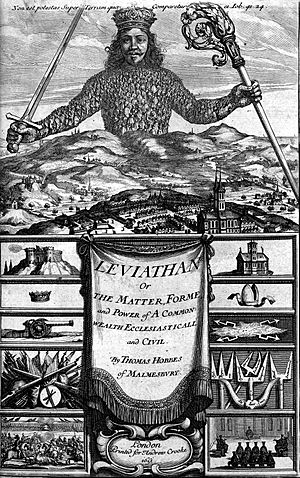Sovereignty facts for kids
Sovereignty means a government has full control over its area. This idea, that a government's power comes from helping its people, is very old. It goes back to ancient Greece and even earlier.
The exact meaning of sovereignty has changed over time. Today, we often link the idea of sovereignty to an agreement made in 1648 called the Peace of Westphalia. This agreement between European rulers said a few important things:
- No one should try to break up a sovereign government.
- No one should enter another country's land, water, or air without permission.
- A sovereign government is the only one that can make laws in its own territory.
Contents
Sovereignty in the Past
Ancient Rome's Rulers
Ancient Rome started as a republic, where people had a say. But later, Octavian created the Roman Empire. The Roman Emperor then said he was "sovereign." This meant he could make any law he wanted. He did not have to follow the laws himself.
Middle Ages Challenges
During the Middle Ages, many kings and rulers were not fully sovereign. They often had to listen to powerful leaders like the Pope, who was the head of the Catholic Church. Because of this, the idea of a single, all-powerful ruler was not common.
The Reformation and New Ideas
In the 1500s and 1600s, during the Protestant Reformation, governments started to become more independent from religious leaders. Many wars also happened within countries, like the English Civil War. This war was fought between different groups inside England.
The Peace of Westphalia was signed during this time. It helped bring back the idea of "sovereignty." Now, governments were seen as separate from outside religious leaders. Also, only one government or ruler inside a country could make laws.
Enlightenment Thinkers
An English thinker named Thomas Hobbes wrote a book in 1651. He said that rulers and governments are "sovereign" because they keep people safe. Hobbes also had a new idea: people could change their rulers if they were not safe.
Later, in 1763, Jean-Jacques Rousseau wrote a book. He believed that sovereignty comes only from the choices of the people.
In 1789, the French Revolution happened. For the first time since the Middle Ages, a major country's government was ruled by the choices of its people. There were many problems at first, and France went back to older ways. But it eventually became a Democracy in the 1870s. In England, more people got to vote after The Reform Act in 1832. The United States also became independent from England in 1776.
Sovereignty Today
Between Countries
When we talk about "sovereignty" between countries, it means the rights a Sovereign state has over its own land. This includes its water and air space.
Sometimes, there are discussions about when a government might lose its sovereignty. This can happen if it treats its own people very badly. In such cases, other countries might feel they need to step in, even if it means going against that government's sovereignty.
Inside a Country
When we talk about "sovereignty" within one country, it usually means which group has the right to rule. This right is called legitimacy. Sometimes, a group that is strong enough to rule, like one with a powerful military, might not be seen as having the true right to rule.
See also
 In Spanish: Soberanía para niños
In Spanish: Soberanía para niños


